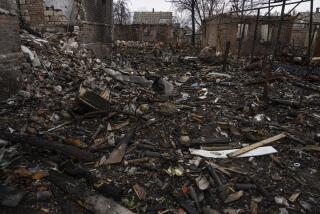Milosevic’s Evil Politics in the Dock
- Share via
Former Serbian President Slobodan Milosevic sits in Scheveningen prison, charged by the tribunal in The Hague with genocide, crimes against humanity and war crimes in Kosovo, Bosnia and Croatia. It is unquestionably the biggest, most important war crimes trial in Europe since World War II. But it has been long and tedious too: The prosecution took two years to make its case; on Aug. 31, Milosevic is finally expected to start his defense, which has been postponed repeatedly because of his health. The result is that the case -- and Milosevic himself -- has almost been forgotten by the world.
Now, Milosevic’s health seems to be getting worse; he has problems with high blood pressure, with his heart and God knows what else. After all, he is a man of a certain age with plenty of worries. Not only does he worry about his forthcoming defense, but he certainly worries about the destiny of his family and possibly even about his country as well. In Scheveningen, Milosevic is surrounded by criminals and warlords, by peasants, professional soldiers and prison guards -- not exactly the kind of company that would be likely to cheer him up. And he is no longer in power, a situation he most probably has difficulties getting used to as well.
Milosevic’s wife, Mira, is in hiding from the Serbian police, presumably somewhere in Russia, because of her alleged involvement in the murder of politician Ivan Stambolic several years ago. It is hard to imagine a bigger punishment for Milosevic than not to see his wife. If there is one human side of this man, it is his love for his wife. They have been almost pathologically tied to each other for more than 40 years, since their high school days in Pozarevac. When they’re together, he calls her “Baby” and she calls him “Beauty.”
Of course, there is another, dark side to their relationship: Mira Markovic was the most influential person in his life, taking part in all his decisions -- a partner in his alleged crimes.
Since entering prison, Milosevic has changed both physically and psychologically. His hair has become completely white and his back gets more and more bent each time I see him. Although still cynical, he is noticeably less aggressive in the courtroom. At the beginning, he was cocky. His arrest had been a worldwide sensation, and he was aware of that as he took the floor in a courtroom filled with reporters, refusing to recognize the jurisdiction of the tribunal. In those early days, I became intimate with his gestures -- his eyes scanning the public, his grimaces, his movements, his tics.
But as the trial went on, media interest dropped off. Milosevic mellowed, collaborating more with his captors. Perhaps he realized, after all, that his destiny was in their hands.
Since Milosevic was arrested in 2001 and brought to The Hague, the world has changed considerably. The war in Iraq has turned all eyes toward the Muslim world. Saddam Hussein, an even bigger villain, was sought and, ultimately, arrested. The Balkans are out of the world’s focus now, unimportant; the brutal wars there are quickly being forgotten. By the time Milosevic’s turn comes to defend himself, there might not be much interest in him any longer.
This is bad news for us, and it is bad news for him too because he wants a world stage for his defense. Of course, “defend” in his case is probably the wrong word. To defend himself would mean to recognize the court, listen to its accusations and accept the possibility of his guilt. But Milosevic continues to insist that his trial is merely a show trial and that he has been convicted and sentenced in advance.
Judging from his previous appearances, he will seek to expose the trial as the sham he believes it is. In his own view, he was an innocent victim of a plot by the mighty Western powers against his small, independent country. It is no exaggeration to say that Milosevic sees himself as a Serbian Nelson Mandela -- a fighter for the freedom of his people.
Milosevic would have us believe he would never hurt a fly, and very possibly it is true. The more I see of the individual cases of war criminals, the less I believe them to be monsters.
As far as I know, Milosevic never killed anybody himself. But he is not on trial because he is a murderer. He is on trial because even though he may never have lifted a finger in violence, his decade-long murderous nationalist politics created the conditions that produced hatred and killings and threw Yugoslavia into a whirlpool of death and chaos. It is those murderous politics (which ultimately led to the deaths of more than 200,000 people), not only his personal acts, that are standing trial in The Hague.
More to Read
Sign up for Essential California
The most important California stories and recommendations in your inbox every morning.
You may occasionally receive promotional content from the Los Angeles Times.










